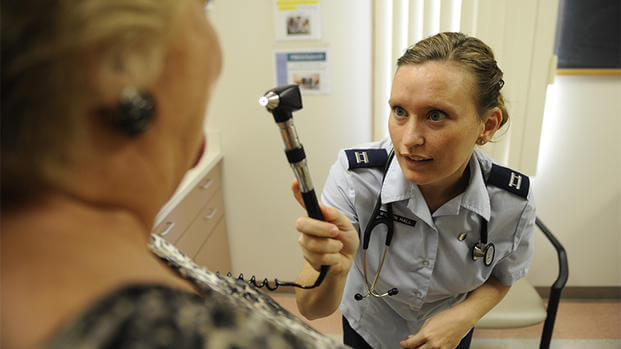It's that time of year again: when Congress proposes big changes to all sorts of Defense Department related things, debates them for awhile, confuses everyone and then, ultimately, passes some sort of legislation that does almost nothing and orders a bunch of reports instead.
I kid. Sort of.
The reality is that this year we are actually likely to see some sort of Tricare reform come to fruition - but just what kind remains to be seen. The House and Senate both have different ideas about what should be done. And while their plans do have many similarities, I think it's time that we break it down SpouseBuzz style. In other words: in real-person English.
Here are their grand plans. And, big reminder here, all of this stuff is still in flux.
The plans for the plans:
Right now: We've got two basic Tricare options: Tricare Prime and Tricare Standard. There are some more nuanced versions of those for different groups (like Tricare Prime Remote or Tricare Young Adult) but they are all the same basic idea. Prime requires you to be seen at a Military Treatment Facility (MTF) if one is around and receive a butt-ton of referrals for stuff, and Standard gives you the freedom to pick your own doctor from within the network and self refer. Prime is free for active duty (and carries an enrollment fee for retirees) and Standard has a cost for everyone.
The House wants to: Shake it out, shake-shake it out. They want to keep Prime while blending some of the other Tricare plans into Tricare Preferred. All Tricare Preferred users would probably have an enrollment fee starting in 2020 if Tricare can prove that it's been good and figured out how to make sure everyone can get access to care to the satisfaction of Congress. Retirees would pay higher enrollment fees than they do now. All new active duty families starting in 2018 would have to pay an enrollment fee as well, regardless of plan. That's a big change -- currently no active duty members pay enrollment fees for Tricare.
The Senate wants to: Also shake it out. They want to keep Prime and combine the other plans into Tricare Choice. They'd also have higher and new enrollment fees, but none of them would be for active duty families. They would also create Secret Tricare Option 3 (not an official title) called "Tricare Choice" that would allow you to buy Tricare as a supplemental insurance for another plan. That could come in handy if you have an employer-sponsored health plan that isn't that great and you want more insurance.
If you ever get prescription drugs:
Right now: You pay pretty low fees, all things considered, that depend on what kind of drugs you get and where you get them. Drugs from the MTF are free (free! free!) but sometimes limited. Drugs from the mail order pharmacy are free if they're generic and cost $20 for a 90-day supply. If you're hitting up a retail pharmacy, yiou're paying $10 for a 30-day generic supply and $24 for a brand name.
The Senate wants to: Increase your fees. Between now and 2025, the cost of those generics at retail pharmacies would rise to $14, while a brand name would become $45. By 2024, generics via mail would be $14, while brand names by mail would be $45. Military treatment facility drugs would still be free (free! free!).
The House wants to: Do nothing ... except order a report about whether or not the DoD would actually save money by making it easier for Tricare users to get their drugs from retail pharmacies. A report? What a shock. (<---- sarcasm).
If you care about Urgent Care:
Right now: If you remember, thanks to a pilot program ordered by Congress for 2016, every Tricare Prime user gets two freebie, no-referral-needed- Urgent care visits per year to call their very own. That goodness started May 23. After that you need a referral, which sometimes you can get from the Tricare nurse advice line, but mostly you have to get from you provider. If you're on Standard you can already go to Urgent Care without a referral, so this isn't about you.
The House and Senate both want to: Eliminate the need for referrals entirely. No two-visit cap. No nurse advice line. Just you and the urgent care. Glory be.
If you like to miss appointments:
Right now: Missing appointments is kind of no big deal at a military treatment facility. Oh, they might give you the side eye, but it's not like it costs anything.
The Senate wants to: Charge you money. They don't really say how much -- just that the DoD should do it if you don't cancel within 24 hours or fail to show-up.
The House: Didn't bother with this.
If you're in the Reserves:
Right now: You can buy Tricare Reserve Select. It works a lot like Standard, except that you also pay a $200-odd monthly enrollment fee. It's pretty great compared to many civilian health insurance plans.
The Senate wants to: Run a pilot program in which you can instead by civilian healthcare from the DoD, not unlike what you'd get from your civilian employer. There's not a ton of details on cost in the proposal, but my educated guess is that it would cost more than Tricare, since pretty much everything costs more than Tricare.
The House: doesn't say anything about this one, either.
Other juicy Tricare tidbits:
Yes, there are a few other Tricare tidbits proposed in both the House and Senate legislation -- a few reports on this and that, for example, and a plan by the Senate to let Tricare cover "specialty food" needed medically for some conditions, like Crohn's disease. As always, you can go and read the legislation for yourself, too. Here is the Senate's version, and here is the House version.
Don't have too much fun with that, you hear?









